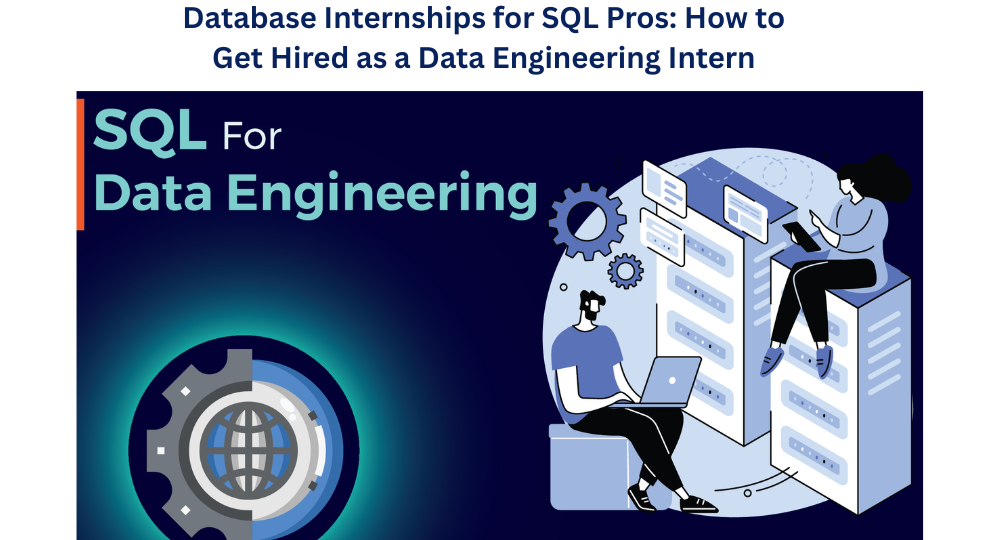Database Internships for SQL Pros: How to Get Hired as a Data Engineering Intern

Thinking about starting a career in data engineering? A database internship could be your golden ticket. In today’s data-driven world, companies depend on skilled SQL pros who can manage, analyze, and transform data into insights. If you’re already good with SQL or planning to master it, internships in this field can fast-track your career.
Let’s dive deep into how you can land a database internship as an aspiring data engineer.
Understanding Database Internships
What is a Database Internship?
A database internship is an entry-level opportunity for students and fresh graduates to gain real-world experience working with databases. You’ll practice everything from writing SQL queries to managing large datasets.
Difference Between Database and Data Engineering Internships
While database internships focus on managing and optimizing databases, data engineering internships go a step further. They involve building pipelines, integrating different data sources, and preparing data for analytics.
Why SQL Pros are in Demand
Role of SQL in Modern Companies
SQL is the language of data. Every business—from startups to global corporations—needs people who can extract, analyze, and manage information stored in databases.
SQL as a Must-Have Skill for Data Engineers
Without SQL, a data engineer is like a carpenter without tools. Whether you’re using Hadoop, Spark, or cloud-based solutions, SQL knowledge remains at the core of your daily tasks.
Essential Skills for Database Internships
SQL Fundamentals
You’ll need to master basics like SELECT queries, JOINs, GROUP BY, subqueries, and indexing.
Data Modeling and Normalization
Understanding how to design efficient databases ensures data is stored without redundancy and is easy to retrieve.
Working with Large Datasets
Interns often handle millions of rows. Knowing how to optimize queries for speed is crucial.
Tools and Technologies
Be comfortable with systems like MySQL, PostgreSQL, MS SQL Server, and Oracle. Each company may use a different database.
Data Engineering Skills to Learn
Python and Scripting
Python is widely used for automation, data cleaning, and integration. Pairing it with SQL makes you unstoppable.
ETL (Extract, Transform, Load) Processes
This is the bread and butter of data engineers. You’ll design pipelines to pull data from multiple sources, clean it, and load it into warehouses.
Big Data Tools
Frameworks like Hadoop and Spark let you work with massive datasets. Learning them is a game-changer.
Cloud Platforms
AWS Redshift, Google BigQuery, and Azure Data Lake are everywhere. Interns with cloud experience often have an edge.
How to Find the Right Internship
Online Platforms
Websites like LinkedIn, Glassdoor, Internshala, and Indeed are packed with internship opportunities.
University Placement Programs
Don’t overlook your campus career services. Many companies recruit directly from universities.
Networking and Referrals
Connections can get you through the door faster than an online application. Attend meetups, join LinkedIn groups, and ask mentors for referrals.
Building a Portfolio for SQL Internships
Personal Projects
Build sample databases, run queries, and create dashboards. Even a small project on customer data analysis can showcase your skills.
Open-Source Contributions
Contributing to GitHub projects makes you visible to employers.
GitHub as a Portfolio
Upload your SQL scripts and projects on GitHub—it acts as your online resume.
Resume and Application Tips
Highlight SQL and Data Projects
Include academic projects, personal work, or freelance gigs where you used SQL.
Tailor Resume for Each Role
Customize your resume based on the company’s job description.
Showcase Problem-Solving Examples
Instead of saying “I know SQL,” write “Optimized queries to reduce execution time by 40%.”
Preparing for Internship Interviews
Common SQL Interview Questions
Expect queries about JOINs, indexing, and writing optimized queries.
Data Engineering Interview Scenarios
You might be asked how to design a pipeline or troubleshoot data quality issues.
Behavioral Interview Tips
Be ready to talk about teamwork, deadlines, and problem-solving experiences.
What Companies Look For in Data Interns
Technical Skills
SQL, Python, and database management.
Problem-Solving Mindset
Companies want interns who can think critically and propose solutions.
Teamwork and Communication
Internships are collaborative—good communication makes you stand out.
How to Stand Out from Other Applicants
Certifications
Certifications in SQL, AWS, or Google Cloud show commitment to learning.
Networking on LinkedIn
Engage with recruiters and professionals in the field.
Continuous Learning
Always stay updated on trends and tools in data engineering.
Challenges of Data Engineering Internships
Handling Big Data Pipelines
Processing millions of records can be overwhelming at first.
Debugging SQL Queries
One missing semicolon can ruin your day—but problem-solving sharpens your skills.
Adapting to New Tools Quickly
Each company uses a different tech stack; adaptability is key.
Benefits of Doing a Database Internship
Hands-On Experience
You’ll learn more in three months of real work than in a year of theory.
Mentorship and Learning
Interns often work under experienced engineers who guide them.
Career Growth Opportunities
A good internship can lead to a job offer.
Future Career Paths After Internships
Data Engineer
Designs pipelines and manages big data systems.
Database Administrator (DBA)
Ensures databases are secure, optimized, and available.
Data Analyst and Beyond
Some interns move into analytics, machine learning, or business intelligence.
Conclusion
Database internships are the perfect entry point for SQL enthusiasts dreaming of a career in data engineering. With the right skills, portfolio, and mindset, you can stand out in a competitive market. Focus on mastering SQL, learning additional tools, and showcasing your projects—your first internship might just be the stepping stone to an exciting career in data.
FAQs
Q1: Do I need prior experience to land a SQL internship?
Not necessarily. Strong SQL skills, projects, and a good resume can be enough.
Q2: What industries hire SQL interns?
Finance, healthcare, e-commerce, IT, and almost every sector using data.
Q3: Is Python necessary for data engineering internships?
Yes. While SQL is essential, Python is a major advantage for ETL and automation.
Q4: How long do internships usually last?
Typically 2–6 months, depending on the company.
Q5: Can an internship lead to a full-time role?
Absolutely. Many interns get full-time offers if they perform well.
Comments
Post a Comment